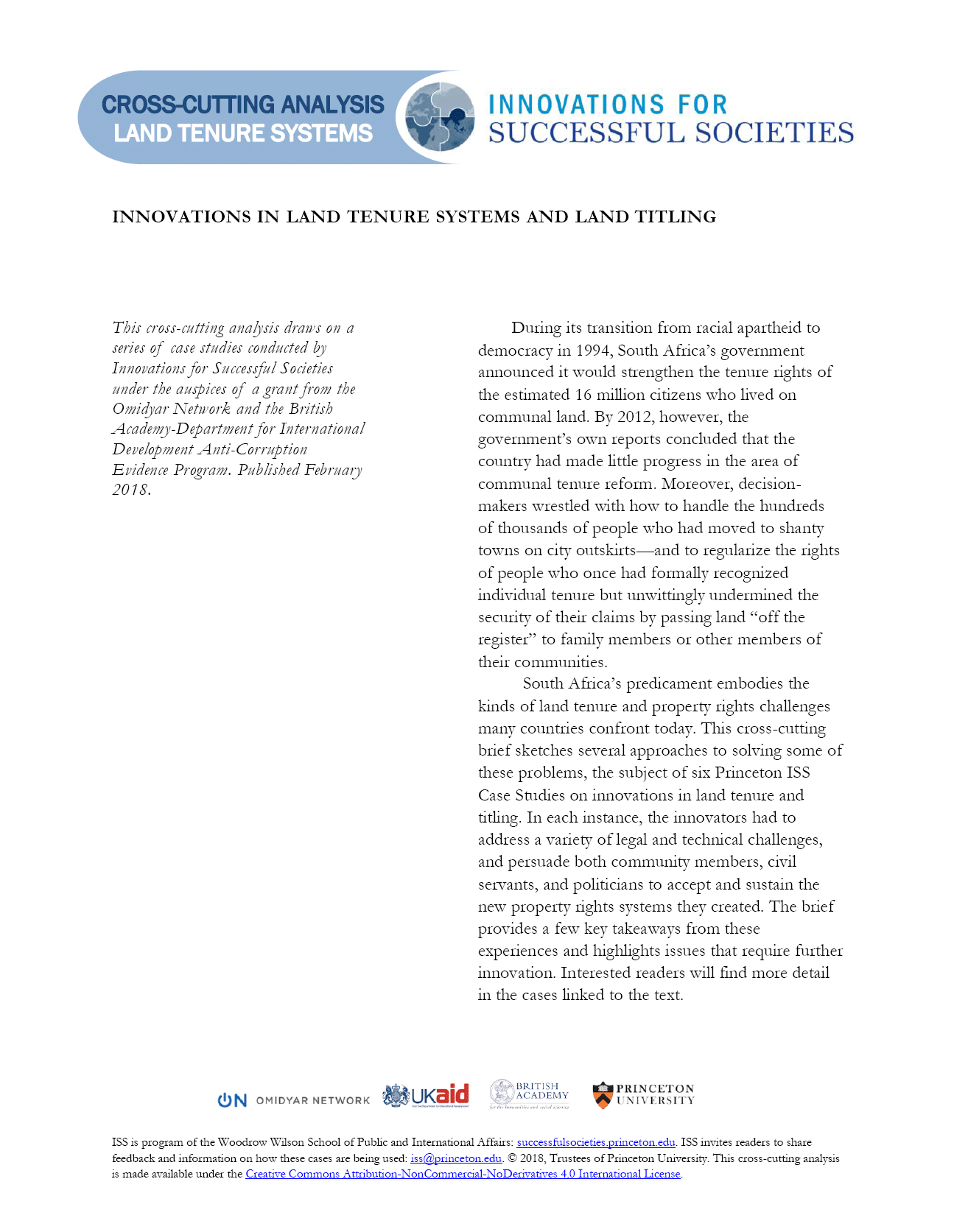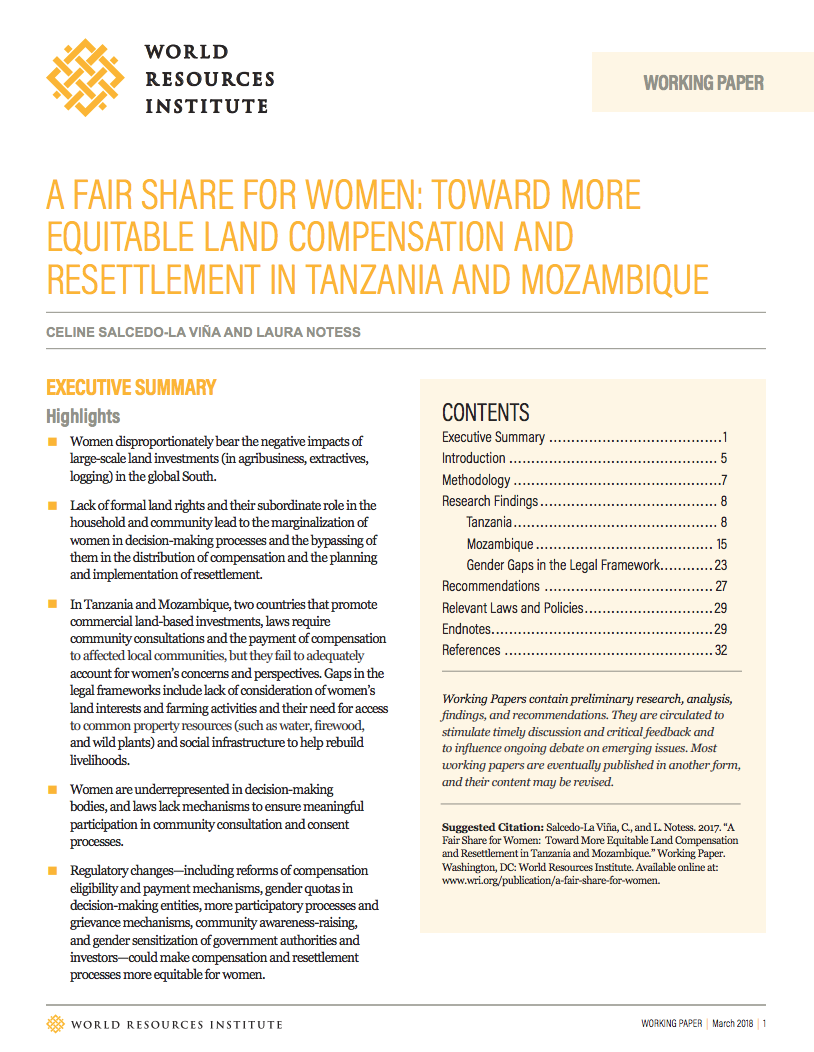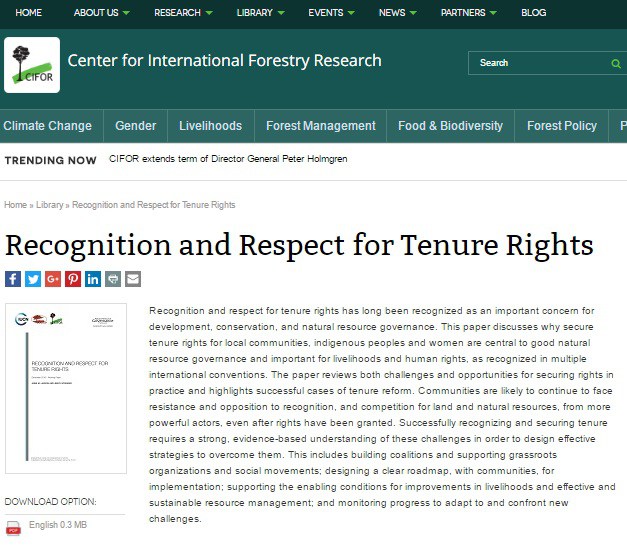sistemas de posse da terra
AGROVOC URI:
Waterlogging and salinity management in the Sindh Province, Pakistan. Volume 2. The farming system: potential for investment and returns in Sindh, Pakistan
Innovations in Land Tenure Systems and Land Titling (Cross-Cutting)
During its transition from racial apartheid to democracy in 1994, South Africa’s government announced it would strengthen the tenure rights of the estimated 16 million citizens who lived on communal land. By 2012, however, the government’s own reports concluded that the country had made little progress in the area of communal tenure reform.
A Fair Share for Women: Toward More Equitable Land Compensation and Resettlement in Tanzania and Mozambique
Tanzania and Mozambique — countries of vast mountain ranges and open stretches of plateaus — now face a growing land problem. As soil degradation, climate change and population growth place enormous strains on the natural resources that sustain millions of people, multinational companies are also gunning for large swaths of land across both countries. Caught between these pressures, many poor, rural communities get displaced or decide to sell their collectively held land.
Introducing the PRIndex Analytical Report 2017
Property rights are a cornerstone of economic development and social justice. One of the most fundamental ways of understanding the strength of property rights is through citizens’ perceptions of them. Yet perceptions of tenure security have never been collected at a global scale, obscuring a clear understanding of the magnitude and nature of citizens’ experience, and preventing the issue of property rights from receiving the visibility and attention it deserves. The Global Property Rights Index, or PRIndex, seeks to address this gap.
Ingonyama Trust Board on its 2014/15 Annual Report
The Ingonyama Trust Board (the Trust) presented its Annual Report for the 2014/2015 financial year. The Trust had committed R6 000 000 for the purchase of tractors to support production on communal land and noted that substantial sums of money were paid out for the benefit of 120 Learners. Employment, HR and vacancy figures were given. The Trust highlighted some performance statistics. In this year, the Board had approved 1 100 tenure rights, falling short of the target of 1 200.
Recognition and Respect for Tenure Rights
Recognition and respect for tenure rights has long been recognized as an important concern for development, conservation, and natural resource governance. This paper discusses why secure tenure rights for local communities, indigenous peoples and women are central to good natural resource governance and important for livelihoods and human rights, as recognized in multiple international conventions. The paper reviews both challenges and opportunities for securing rights in practice and highlights successful cases of tenure reform.
USAID LAND TENURE and PROPERTY RIGHTS PORTAL
We envision a world in which land governance systems, both formal and informal, are effective, accessible, and responsive for all.
LEGAL RECOGNITION OF INDIGENOUS GROUPS
...The main purpose of this paper is to examine legal measures taken to recognize
indigenous groups and provide for their ongoing operation; the paper starts, therefore, from an
underlying assumption that indigenous groups have continued relevance to the needs and wishes
of the people who operate within them. Nevertheless, while it is beyond the scope and purpose of
the paper to explore this complex issue in any depth, it may be useful to present – however briefly
– some of the arguments made for and against the preservation of indigenous groups. In the
The City of Mandalay Development Law - SPDC Law No. 8/2002 (English)
Land Tenure: A foundation for food security in Myanmar’s uplands (Burmese/ မြန်မာဘာသာ )
Access to land for smallholder farmers is a critical foundation for food security in Myanmar's uplands. Land tenure guarantees seem to be eroding and access to land becoming more difficult in some upland areas. If this trend continues it may have negative impacts for food security and undermine environmental and economic sustainability. This briefing paper explores the relationship between land tenure and food security, as well as key institutional and other factors that influence land access and tenure for smallholder farmers in the uplands today...
Farmland Act - Pyidaungsu Hluttaw Law No. 11/2012 (English)
Farmland Act
(Pyidaungsu Hluttaw Law No.ll of 2012)
Day of 8th Waxing of Tagu 1373 ME (30th March, 2012).....The translation has some notable shortcomings...






